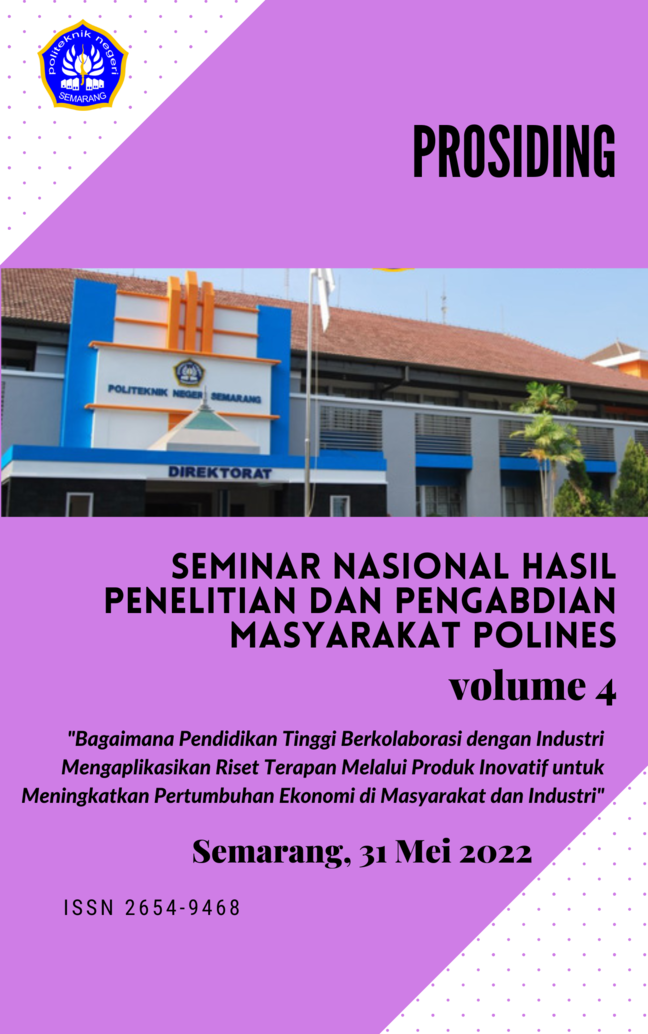ANALISIS MANAJEMEN RESIKO SISTEM PEMBELAJARAN BERBASIS ELEKTRONIK EL-NINO DI POLITEKNIK NEGERI SEMARANG
Keywords:
e learning, el ninoAbstract
Since the implementation of the Covid-19 emergency period on March 16, 2020 by the Government, almost all campuses in Indonesia have adopted policies for online learning. With online learning, lecturers and students alike learn to use technology as a learning medium. In carrying out online learning with various limitations in the use of technology, efforts must be made to carry out online learning so that the process of transforming knowledge to students is not disrupted.
Academic activities related to the e-learning system can provide easy access to lecture materials for students. In addition, students can download and upload assignments, post to discussion forums, and access quizzes. E-learning in higher education can help the higher education institution provide information in the form of announcements related to the ongoing lecture process (Dewi & Yudana, 2016).
In the implementation of e-learning at the Semarang State Polytechnic there is the possibility of the emergence of risks, so risk management is needed to manage and minimize these risks. It is also necessary to control the electronic-based learning system (e-learning) which is carried out regularly. To identify possible risks accurately, the OCTAVE Allegro method can be used. This method describes the identification of risk assessments and can provide mitigation actions against these risks. This can help universities to deal with problems that occur in e-learning.
The formulation of the problems carried out in this study are (1) Semarang State Polytechnic will identify possible risks that can occur during the implementation of e-learning el nino with the OCTAVE Allegro method (2) evaluation of risk management actions as a preventive or control measure at the Polytechnic Semarang State.
The purpose of this study is to analyze the risk management process as a form of risk management for the el nino electronic learning system at the Semarang State Polytechnic in terms of implementing e-learning- el nino.
Based on the results of the study, it was concluded that the most influential Impact areas are: productivity is the first priority, student reputation and trust are the second priority, safety and health are the third priority. Finance is the fourth priority, fines and penalties are the fifth priority. From the analysis of the organization's IT assets, two areas of concern were found, namely Internet network disturbances due to misconfiguration and server down disturbances. Each area of concern that has been identified has its own relative score compared to the value of the relative risk matrix, indicating that the approach taken is risk mitigation and considers containers in the form of control measures.
References
Al-Samarraie, H., Teng, B. K., Alzahrani, A. I., & Alalwan, N. 2017. E-learning continuance satisfaction in higher education: a unified perspective from instructors and students. Studies in Higher Education, 1”“17.
Catherine, Angela, Chatrine Sylvia, Handoko, 2019. Analisis manajemen risiko sistem pembelajaran berbasis elektronik pada perguruan tinggi xyz, in `Seminar Nasional Teknologi Informasi dan Komunikasi, 9-18
Dewi, N. A. N., & Yudana, I. G. P. H. 2016. Analisa Manajemen Risiko Pada Sistem Akademik Di STMIK STIKOM Bali. In Seminar Nasional Teknologi Informasi dan Multimedia, 7”“12.
Ferry N. Indroes. Manajemen Risiko Perbankan: Pemahaman Pendekatan 3 Pilar Kesepakatan Basel II Terkait AplikasiRegulasi dan Pelaksanaannya di Indonesia (Jakarta: Rajawali Pers, 2008), h. 5.
King, E., & Boyatt, R. 2014. Exploring factors that influence adoption of e-learning within higher education. British Journal of Educational Technology, 1”“9.
Rizky Ramadhan, Eman Setiawan, Awaludiyah, 2019, Manajemen Risiko teknologi informasi menggunakan metode Octave Allegro pada Pt Hakiki Donarta, Surabaya, p1-10






